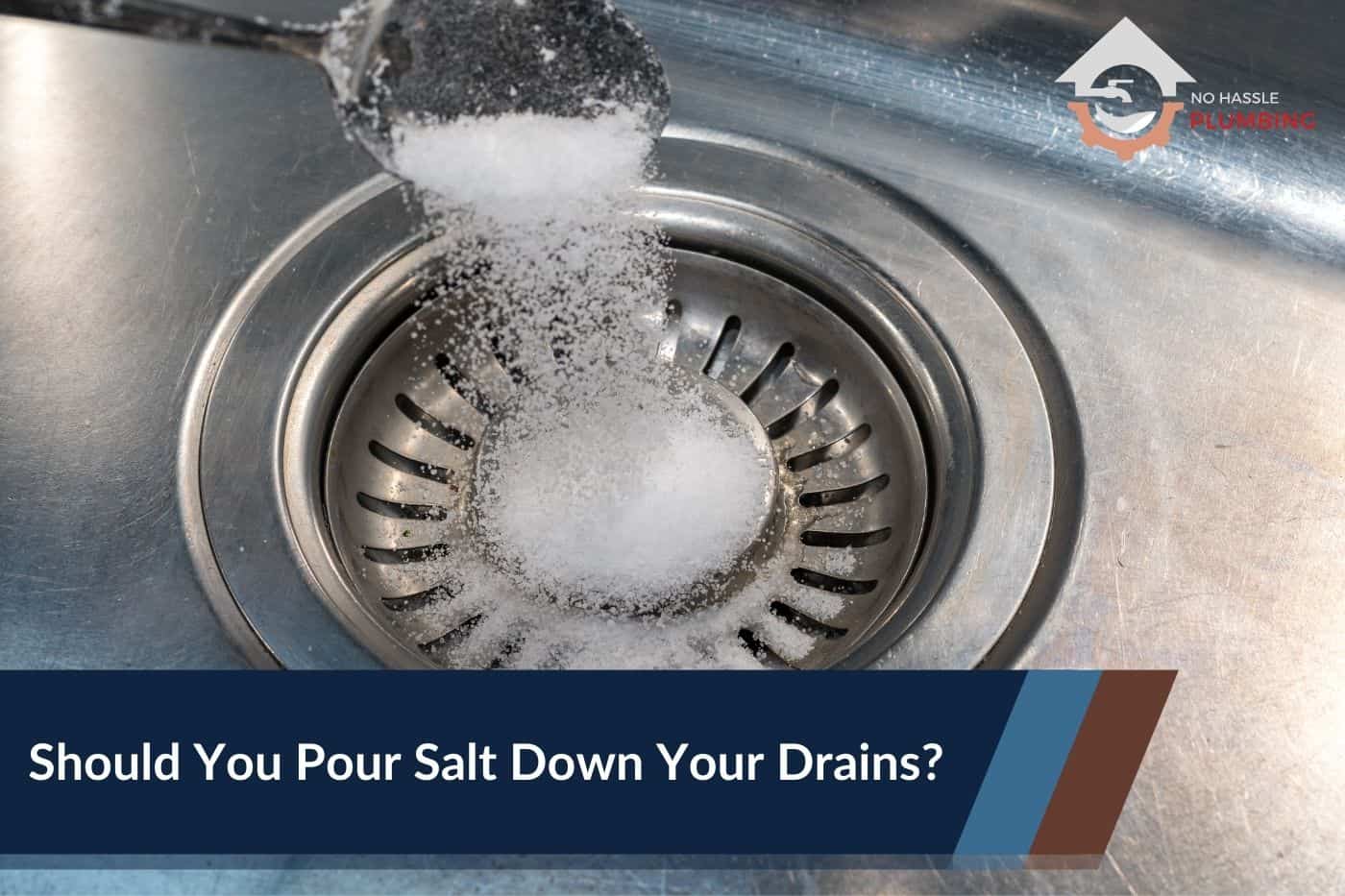SPOILER ALERT! When the click-bait article “Pour Salt Down Your Drain Tonight, Here’s Why” started doing the rounds a few years ago google searches for this “hack” multiplied. Unfortunately, the article never explains why, and most plumbers agree that as homemade drain cleaners go, pouring salt down your drain is unlikely to clear plumbing clogs.
While the “salt hack” isn’t the simple solution many would like us to believe, keep reading to learn why it doesn’t work, how it can help deodorize your plumbing in combination with other household staples, and 7 alternative methods that are more likely to help you clear any clog!
Contents
Does Pouring Salt Down the Drain Help Drain Cleaning?
The common belief is that salt creates a scouring action within pipes to clean them out. However, the quantity of salt required for this method to be effective would be huge and you would also need to use expensive coarse sea salt for it to work. So, in practice, pouring a large quantity of salt down the drain isn’t worth the cost nor among the most effective methods of clearing clogs. In addition, most plumbers would recommend you don’t put anything other than water down your drain in large quantities.
Here comes the caveat though: Using salt on its own may not be the best choice for keeping your drains clear, but there are still some benefits to its use.
While it won’t help unclog your shower or kitchen sink drain on its own, table salt can help clear a blockage when used in conjunction with other household products such as baking powder. In addition, salt can also be beneficial at keeping away pesky drain flies and helping to absorb nasty smells.
Does Pouring Salt And Boiling Water Down the Drain Prevent Clogs?
Hot, salty water can be used as a preventative or deodorizing measure to help keep your drains clear. Here’s a step-by-step guide on how to do it.
- Pour half to one cup of salt down your sink. You can use regular table salt or a coarser salt like kosher salt.
- Pour in 1–2 liters of hot water down the drain. The hot water helps dissolve the salt and flushes it and any gunk away.
- Repeat this process once a month to help prevent clogs from forming and to keep your drains smelling fresh.
If you have a septic system, it’s important to use caution when using salt, as it can harm the bacteria necessary for proper septic system function. Lastly, never pour boiling water if you have a porcelain sink or PVC pipes. The heat can cause the sink to crack and can loosen or even warp the pipes.
How To Clear Clogged Drains: 5 Alternative Remedies
While unclogging your plumbing with salt is not recommended, there are several other effective solutions available to you, from using household items to picking a store-bought solution.
1. Baking Soda & White Vinegar
One of the most common homemade solutions to flush grease, food, and soap scum from sinks or garbage disposals is the combination of baking soda and vinegar.
Simply pour a half cup of baking soda, followed by a half cup of white vinegar down the drain. Cover the plug hole and leave to sit for 10-20 minutes, and then flush the mixture with hot water.
2. Boiling Water & Dish Soap
Heat a pot of water on the stove until it is warm and add a few drops of dish soap, then pour the mixture down the drain. The soap will help break up any gunk or grease that might be sitting in your plumbing system.
3. Drain Snake
Unclogging bathroom or kitchen sink clogs with a drain snake is typically the most effective way of clearing a blockage. A plumbing snake is a long, flexible tool that can be inserted into the drain to break up and remove blockages.
Plumber’s snakes are effective at removing stubborn obstructions like grease, food debris, sanitary products, or a large quantity of hair. They can be purchased at most hardware stores or rented from a home improvement center. However, it’s important to use caution when using a drain auger, as improper use can cause damage to your pipes or fixtures.
4. Chemical Drain Cleaners
Chemical drain cleaners dissolve buildup and debris in pipes, making them an effective solution for clogs. However, they contain several ingredients such as phosphoric acid that are harsh and can be dangerous if not used with caution. Some types may also harm pipes and septic systems, so it’s important to follow instructions carefully and avoid frequent use.
We always recommend wearing protective gloves and glasses when using these products.
5. Plunger
Using a plunger is another effective mechanical method for dealing with a tough clog. Ensure there is an inch or two of water in your sink, then cover the plug hole with your plunger to create a seal. Then pump the plunger to help dislodge the obstruction.
Wrapping Up: Is It Wise to Pour Salt Down Your Drain?
Pouring salt down the drain at night, many believe, can help eliminate unpleasant odors and prevent clogs. However, while this may help to deodorize your drain pipes, it’s generally not effective at cleaning out stubborn clogs or blockages. Using salt to unclog your sink could potentially cause damage to your pipes over time.
For clogs we suggest you try one of our alternative suggestions, and if necessary contact a plumber.
We hope you’ve enjoyed our article, and if you have any questions or comments please write to us below, we always love to hear from you.

